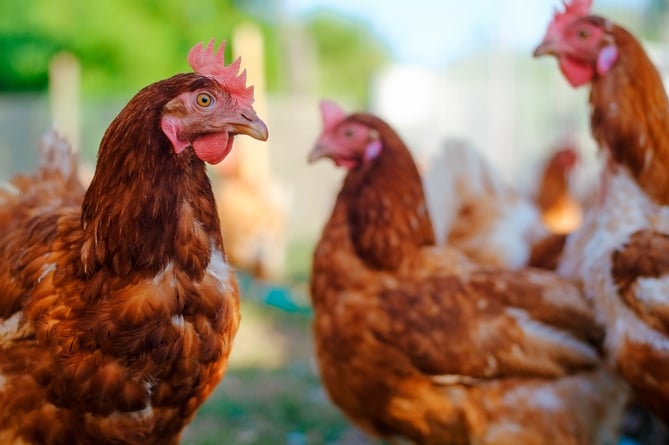THE Avian Influenza Prevention Zone (AIPZ) for poultry and captive birds, introduced to help stop the spread of avian influenza (“bird flu”), has been lifted, today, Tuesday, July 4.
The enhanced biosecurity measures were brought in by the Government on the Instruction of the UK’s Chief Veterinary Officer, across Great Britain in October when there was a medium risk for some poultry premises.
The measures have been vital in protecting flocks across the country from the virus which is circulating in wild birds.
The risk of avian influenza has now reduced to low for all poultry.
As a result, the mandatory requirements were lifted from 12 noon (July 4).
The Department for Environment, Food and Rural Affairs and Animal and Plant Health Agency say that the risk has reduced but as it has seen with recent premises confirmations, it has not gone away.
They say that the scale of avian influenza outbreaks across the UK and Europe have been unprecedented with cases being confirmed into the second year of an outbreak for the first time.
The UK has faced its largest ever outbreak of bird flu with more than 330 cases confirmed across the country since late October 2021.
Here you can find out more about the latest bird flu situation in England and guidance for bird keepers and the public.
The prevention measures introduced through the AIPZ including housing measures are introduced in a phased and escalating manner proportionate to the escalating risk to an area and may be introduced or withdrawn on a regional or national basis depending on the epidemiological situation.
While the restrictions have been lifted, all bird keepers must follow enhanced measures at all times to prevent the risk of future outbreaks and remain vigilant for signs of disease.
Dr Christine Middlemiss, the UK’s Chief Veterinary Officer, said: “Now we are in the summer months and the risk to poultry across Great Britain has reduced, it is the right time to lift the Avian Influenza Prevention Zone.
“This would not have been possible without the hard work of all bird keepers, who have upheld high biosecurity standards for many months. However, there are still localised areas of risk as we have seen recently, and therefore it’s vital that everyone keeps biosecurity and cleanliness at the forefront of their minds to keep their flocks safe.”
All poultry gatherings, including at fairs, shows and markets, remain banned, due to a large number of flocks mixing together and the risk posed by any infections spreading across the country.
The UKHSA advise that the available evidence suggests viruses currently circulating in birds in the UK do not spread easily to people and food standards bodies advise that avian influenzas pose a very low food safety risk for UK consumers. There is no impact on the consumption of properly cooked poultry products, including eggs.
Do not touch or pick up any dead or sick birds that you find and instead report them using the new online reporting system or by calling the Defra helpline.
Avian influenza is in no way connected to the Covid-19 pandemic, which is caused by the SARS-CoV-2 virus and is not carried in poultry or captive birds.
ADVICE TO POULTRY KEEPERS
All bird keepers must keep a close watch on them for signs of disease and maintain good biosecurity at all times. If you have any concerns about the health of your birds, seek prompt advice from your vet.
All bird keepers (whether they are pet birds, a commercial farm or just a few birds in a backyard flock) can remain vigilant and help prevent avian influenza by:
- cleansing and disinfecting clothing, footwear, equipment and vehicles before and after contact with poultry and captive birds – if practical, use disposable protective clothing
- reducing the movement of people, vehicles or equipment to and from areas where poultry and captive birds are kept, to minimise contamination from manure, slurry and other products, and use effective vermin control -thoroughly cleansing and disinfecting housing on a continuous basis -keep fresh disinfectant at the right concentration at all farm and poultry housing entry and exit points
- minimise direct and indirect contact between poultry and captive birds and wild birds, including making sure all feed and water is not accessible to wild birds.
See biosecurity advice for more information.
Avian influenza (bird flu) is a notifiable animal disease. If you suspect any type of avian influenza in poultry or captive birds you must report it immediately by calling the Defra Rural Services Helpline on 03000 200 301.
In Wales, contact 0300 303 8268. In Scotland, contact your local Field Services Office. Failure to do so is an offence.
Cases in England
For details of the current avian influenza H5N1 cases in England and the measures that apply in the disease control zones around these cases, go to the avian influenza: cases and disease control zones in England guidance.
Bird keepers can check what zone they are in this interactive map.
Wild birds
The Animal and Plant Health Agency (APHA) carries out year-round avian influenza surveillance of dead wild birds submitted via public reports and warden patrols.
You should report online or call the Defra helpline if you find:
• One or more dead bird of prey, gull, swan, goose or duck in the same place
• Five or more dead wild birds of any other species in the same place.
APHA then collect some of these birds and test them to help us understand how the disease is distributed geographically and in different types of bird. Not all birds will be collected.
Do not touch or pick up any dead or visibly sick birds that you find. For further information go to: guidance on reporting dead wild birds.
For further details see the report (updated weekly) of findings of HPAI in wild birds in Great Britain.
Sick or injured wild birds should not be reported to the Defra Helpline. You can report sick or injured birds of prey, gulls, swans, geese or ducks in England and Wales to the RSPCA (0300 1234 999) and in Scotland to the SSPCA (03000 999 999).
The RSPCA website carries information on what to do if you find a wild bird from a smaller species.



